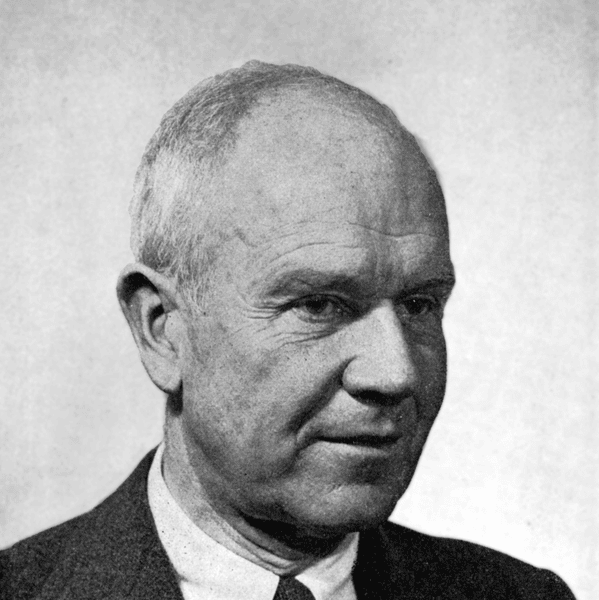Presidential Address
In Memoriam
From the American Historical Review 74:2 (December 1968)
Crane Brinton (February 25, 1898–September 7, 1968), MacLean Professor of Ancient and Modern History Emeritus in Harvard University, died in Cambridge, Massachusetts, September 7. He was seventy years old and had retired from active teaching at the close of the preceding academic year. Few historians of his time have been more productive or more widely influential both within and outside the profession.
Born in 1898 in Winsted, Connecticut, he attended Harvard College, taking his AB there in 1919, and as a Rhodes scholar went on to Oxford University, where he earned the DPhil in 1923. He returned to Harvard as an instructor in history and rose through the ranks to a professorship in 1942. He was a senior fellow of the Society of Fellows and for twenty-two years presided over the society as its chairman. During World War II he served with the Office of Strategic Services in London and Washington. In 1957–1958 he was a fellow of the Center for Advanced Study in the Behavioral Sciences.
His combination of erudition, sophistication, kindliness, and a gentle flippancy made him one of Harvard’s most popular teachers and a good companion. His course on the intellectual history of Europe in the eighteenth and nineteenth centuries for many years attracted the largest enrollment of any class in Harvard College. He had a reputation—justified, he conceded—as an easy grader for undergraduates, but he could be an exacting tutor and seminar director, insisting on the same high standards of scholarship, reflection, and expression that he imposed upon himself. He was a stimulating conversationalist, a delightful walking and motoring companion, and a discriminating gourmet. No American knew the back roads of New England, the public paths of the home counties, or the starred restaurants of France better than he.
He served the profession in many ways and received numerous professional honors. He was President of the American Historical Association in 1963, President of the Society for French Historical Studies in 1962–1963, and a member of the editorial boards of the American Scholar, the Journal of the History of Ideas, French Historical Studies, and History and Theory. The National Institute of Arts and Letters elected him to membership in 1955, and he was a Fellow of the Royal Historical Society and a knight of the Legion of Honor.
Brinton’s bibliography includes fifteen volumes. Among them is one monograph based on archival research, The Jacobins: An Essay in the New History, first published in 1930 and republished in 1961. Brinton called it his “brick for the temple of scholarship.” His typical books are works of synthesis and interpretation, all of them marked by fresh insights and pleasing literary style. Probably most influential is The Anatomy of Revolution, the outgrowth of a series of Lowell Lectures, published in 1938 and issued in revised editions in 1952 and 1965. Together with A Decade of Revolution, 1789–1799 (1934), it established him as an authority on revolutions with a reputation that extended beyond the bounds of academe. Among his other books, The Lives of Talleyrand (1936), English Political Thought in the Nineteenth Century (1933), and Ideas and Men (1950) have influenced generations of American students. His last book, The Americans and the French, which appeared only a few months before his death, reflects a lifetime of perceptive observation of America and France and is a final delight to all who cherish the Brintonian wit and style.
Bibliography
The political ideas of the English romanticists, by Crane Brinton. London, Oxford University Press: H. Milford, 1926.
The Jacobins; an essay in the new history, by Clarence Crane Brinton. New York: The Macmillan company, 1930.
English political thought in the nineteenth century, by Crane Brinton. London: E. Benn, 1933.
A decade of revolution, 1789-1799, by Crane Brinton. New York, London: Harper & Brothers, 1934; Reprint, Westport, Conn.: Greenwood Press, 1983, 1934.
French revolutionary legislation on illegitimacy, 1789-1804, by Crane Brinton. Cambridge: Harvard University Press, 1936.
The lives of Talleyrand, by Crane Brinton. New York: Norton, 1936.
The anatomy of revolution, by Crane Brinton. 1st ed. New York: W.W. Norton, 1938.
Nietzsche, by Crane Brinton. Cambridge, Mass.: Harvard university press, 1941.
The United States and Britain, by Crane Brinton. Maps prepared under the cartographic direction of Arthur H. Robinson. Cambridge, Mass.: Harvard University Press, 1945.
From many, one. Cambridge: Harvard University Press, 1948.
English political thought in the nineteenth century. Cambridge: Harvard University Press, 1949.
Ideas and men; the story of Western thought. New York, Prentice-Hall, 1950.
The anatomy of revolution. Rev. ed. New York: Prentice-Hall, 1952.
The temper of western Europe. Cambridge: Harvard University Press, 1953.
Modern civilization; a history of the last five centuries, by Crane Brinton, John B. Christopher and Robert Lee Wolff. Englewood Cliffs, N.J., Prentice-Hall, 1957.
A history of Western morals. 1st ed. New York, Harcourt, Brace, 1959; Reprint, 1st pbk. ed. New York: Paragon House, 1990.
The fate of man, edited with introductions and postscript. New York: G. Braziller, 1961.
